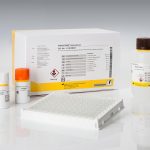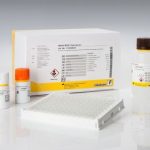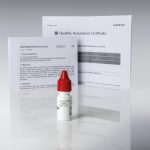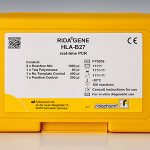Intended use:
For in vitro diagnostic use. RIDASCREEN® Helicobacter is an enzyme immunoassay (EIA) for the qualitative detection of Helicobacter pylori-specific antigen in human stool specimens.
General information:
Gastric infection with the bacterium Helicobacter pylori is linked to the development of gastrointestinal diseases, such as chronic gastritis, gastric ulcers, ulcers of the small intestine and gastric cancer. In fact, chronic inflammation induced by H. pylori increases the risk of stomach cancer 5 to 90-fold. Persons infected with H. pylori are therefore at higher risk of developing serious illnesses.
The diagnosis of H. pylori infection is usually performed via invasive methods requiring endoscopy and biopsy. The detectability of the H. pylori-specific antigens in stool samples is an ideal method for non-invasive and direct detection of an H. pylori infection of the gastrointestinal tract.
Empower your laboratory work with convincing performance:
- High-performance diagnostics with notable comparablility to invasive testing methods
- Easy interpretation due to a very good distinction of negative and positive results
- Guideline-compliant work on the use of monoclonal antibodies
Publications:
- Bénéjat et al., 2020. Evaluation of RIDASCREEN® and RIDA®QUICK Helicobacter kits for Helicobacter pylori detection in stools.
- Ignatius et al., 2019. Accurate Detection of Helicobacter pylori Antigen in Human Stool Specimens by Two Novel Immunoassays.
- van Gessel et al. R-Biopharm RIDASCREEN® Helicobacter and Generic Assays Helicobacter pylori compared to OXOID Amplified IDEIA HpStAR.
Image Gallery
Accessories:
Single Components:
- RIDASCREEN® Control – (Negative Control)
- RIDASCREEN® Diluent 1
- RIDASCREEN® Substrate
- RIDASCREEN® Stop
- RIDASCREEN® Wash buffer 10x
| Art. No. | C2302 |
|---|---|
| Test format | ELISA consisting of 96 tests |
| Sensitivity | 90.5 % |
| Specificity | 97.9 % |
Dear customers,
we have started to provide the documents for our products in an electronic format. These are the Instructions for Use (IFU), the Safety Data Sheets (SDS) and the Certificate of Analysis (CoA). For batches placed on the market after 01 January 2023, you can find our documents on the eIFU portal eifu.r-biopharm.com/clinic.












